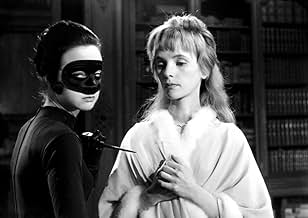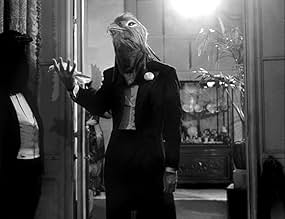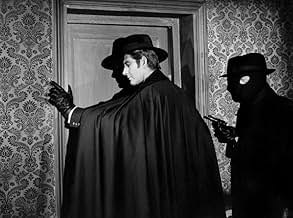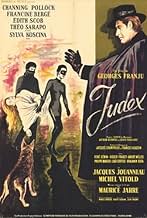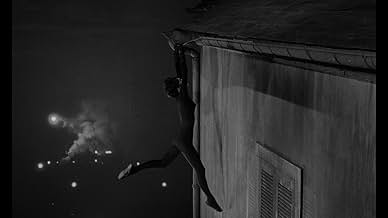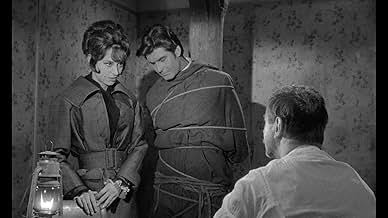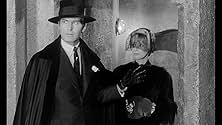VALUTAZIONE IMDb
7,0/10
3077
LA TUA VALUTAZIONE
Un banchiere senza scrupoli riceve un biglietto minaccioso, firmato da "Judex", che gli chiede di ripagare le persone che ha truffato. Egli rifiuta e sembra affrontare il suo destino.Un banchiere senza scrupoli riceve un biglietto minaccioso, firmato da "Judex", che gli chiede di ripagare le persone che ha truffato. Egli rifiuta e sembra affrontare il suo destino.Un banchiere senza scrupoli riceve un biglietto minaccioso, firmato da "Judex", che gli chiede di ripagare le persone che ha truffato. Egli rifiuta e sembra affrontare il suo destino.
- Regia
- Sceneggiatura
- Star
Recensioni in evidenza
This film is most certainly worth a watch if you're at all interested in classic film. Highly stylized and full of fun and suspenseful moments, Judex is a gem amongst crime thrillers.
There are quite a bit of issues that keep it from being a perfect film though, not the least of which is how dated it is. As some shots and practical effects are less than stellar, almost comical at times.
At points as the story goes on you'll likely find yourself thinking "Well that's convenient" or "What, how?". But a lot of that can be chocked up to the already ridiculous nature of the plot, and aren't necessarily due to negligence from the screenwriter.
The acting from some characters can be a bit off putting at times as well, but there's enough great performances in there to offset that.
However despite its flaws this is a good early film for the genre.
There are quite a bit of issues that keep it from being a perfect film though, not the least of which is how dated it is. As some shots and practical effects are less than stellar, almost comical at times.
At points as the story goes on you'll likely find yourself thinking "Well that's convenient" or "What, how?". But a lot of that can be chocked up to the already ridiculous nature of the plot, and aren't necessarily due to negligence from the screenwriter.
The acting from some characters can be a bit off putting at times as well, but there's enough great performances in there to offset that.
However despite its flaws this is a good early film for the genre.
Louis Feuillade, one of the true pioneers of cinema whose work has undeniably influenced Lang and Hitchcock, had been criticised for glorifying villainy in his hugely popular serials 'Fantomas' and 'Les Vampires'. He redressed the balance somewhat by creating Judex, a hero who is both judge and jury.
Director Georges Franju has managed here to reduce the original 5 hour, 12 episode original to just 97 minutes which is no mean feat although unavoidably, compromises have had to be made.
Some have confessed to being baffled by the twists and turns of the admittedly condensed plot but their bafflement quite frankly baffles me as the film is sufficiently well-constructed and the pace certainly slow enough not to cause confusion.
Feuillade's work is known for its anarchy and surrealism. This adaptation has little anarchy and its surrealism is mixed with realism. This is Lunacy restrained. Essentially a film of moments, or 'set pieces' if you like, Franju's unique visual style and sense of atmosphere make it mesmerising to watch.
Behind every great fortune there is usually a great crime and banker Favraux, played superbly by Michel Vitold, has enriched himself by the Panama Scandal. He is called to account for his crime in an anonymous letter which threatens death at midnight if he does not atone and return to his victims his ill-gotten gains. He chooses to ignore this warning and at the stroke of midnight at a masked ball he appears to drop dead, only to awaken in an old castle to find himself the prisoner of a mysterious figure in a cloak and a slouch hat.............
Judex is here played by Channing Pollock, a handsome hunk who made a few European costume films at this time. He began as a magician and in this is able to perform his famous 'dove act'. As an actor alas, he is a plank.
Franju regular Edith Scob as the banker's daughter is required to do little more than play a Miss Goody Two Shoes but the camera loves her will o' the wisp persona.
Saints are not nearly as interesting as sinners of course and by far the most fascinating character is that of Diana di Monti. As a ruthless, sensual and utterly deranged villainess she is a gift to any actress and is here played with relish and aplomb by Francine Berge, complete with catsuit and nun's habit, wielding a dagger and a hypodermic needle. Her choreographed fight on the rooftop with luscious Sylva Koscina as Daisy the circus performer is guaranteed to quicken the pulse. Franju is reported to have said of Daisy's character: "I could have done without her" but happily for us he couldn't!
Jacques Jouanneau does a good turn as the incompetent detective Cocantin and there is a captivating performance by Benjamin Boda as Reglisse the boy. Also of interest is a brief appearance as a doctor by Andre Melies, son of that other pioneer director, Georges.
Mention must be made of Robert Giordani's superlative art direction, Marcel Fradetal's magnificent cinematography and Maurice Jarre's atmospheric score.
Whatever its weaknesses this bizarre opus is immensely entertaining and can be revisited with pleasure. Ideally one could have done with a little more flamboyance but that after all, is simply not Franju's way.
Georges Franju is an unfairly neglected director - overshadowed by Godard and Truffaut, he fell quickly out of favour as a filmmaker, although he is revered as co-founder, with Henri Langlois, of the Cinematheque Française in Paris shortly before World War 2.
The influences to be seen in Franju's films are not those of New Wave directors: Hollywood film noir and trashy American novels. He is more in tune with German Expressionism and, as perhaps befits a film archivist, with silent cinema.
So JUDEX is a very affectionate tribute to Louis Feuillade, and shares its title with a 1916 serial. As the title character Franju cast a magician - Channing Pollock - and other actors include the wonderful Edith Scob (unforgettable in Franju's EYES WITHOUT A FACE), Andre Melies (son of Georges) and Theo Sarapo (one-time lover of Edith Piaf). The music is by Maurice Jarre, and adds to the dreamlike nature of the whole story.
JUDEX may not be a great film, but it is a truly wonderful film. Just let it wash over you, and the memory of it may haunt you for a surprisingly long time!
The influences to be seen in Franju's films are not those of New Wave directors: Hollywood film noir and trashy American novels. He is more in tune with German Expressionism and, as perhaps befits a film archivist, with silent cinema.
So JUDEX is a very affectionate tribute to Louis Feuillade, and shares its title with a 1916 serial. As the title character Franju cast a magician - Channing Pollock - and other actors include the wonderful Edith Scob (unforgettable in Franju's EYES WITHOUT A FACE), Andre Melies (son of Georges) and Theo Sarapo (one-time lover of Edith Piaf). The music is by Maurice Jarre, and adds to the dreamlike nature of the whole story.
JUDEX may not be a great film, but it is a truly wonderful film. Just let it wash over you, and the memory of it may haunt you for a surprisingly long time!
Franju's evocation of a lost innocent era of French silent cinema is a real gem, and a much neglected film. The film creates an air of gentle menace from the opening scenes featuring a bird-masked magician at a masked ball. We soon learn that he is, in fact, Judex, the legendary crime-fighter. He soon becomes engaged in a battle with a cat-suited female criminal. The plot itself is one-dimensional comic-strip stuff, as the above suggests, but what constantly impresses is the poetic set-pieces Franju sets up, particularly a burglary at a country house swathed in mists. The show is continually stolen by Francine Berge, as the criminal - she seems a not-too-distant relation of Diana Rigg in television's "The Avengers", at least in dress sense - and this highlights a slight problem. The hero, played by American magician Channing Pollock, is bland by comparison, as is Edith Scob's heroine-in-distress. It seems that the bad girls get all the fun! Overall, this is the type of film that doesn't get made any more, yet doesn't seem dated. Franju's more famous "Les Yeux Sans Visage" is, in terms of mood, very similar, as is Cocteau's breathtaking fairy tale, "La Belle Et La Bete". The sixties British horror, "The Haunting", also pulls the same trick of showing little by achieving everything through mood alone. Do try to see all of these if you get the chance.
French remake of a 1914 serial involving a "crime fighter" who uses masks and deception to right wrongs and such. Similar in someways to a more real batman. This remake has Judex-the Latin for judge- going after a banker who swindled people by telling him that if he didn't repay the money he would die. And die he does-or so it appears as Judex spirits the man away and hold him prisoner. From there it gets complicated. Good but unremarkable as a whole mystery/adventure story set in the late 1800's thats perfect for late night viewing since its the sort of thing I used to run across at 2am. Worth a look if you run across it but I don't know if I'd go out of my way to see it.
Lo sapevi?
- QuizAwarded the Coupe Jean-George Auriol 1963, by the jury's unanimous decision, in France.
- BlooperJust before Cocatin, the private detective, sits down at Favraux's desk, a moving shadow of the boom microphone is briefly visible on the curtains at the top of the frame.
- Citazioni
Alfred Cocantin: What's all this about nuns?
- ConnessioniFeatured in Cinéma, de notre temps: Georges Franju, le visionnaire (1996)
I più visti
Accedi per valutare e creare un elenco di titoli salvati per ottenere consigli personalizzati
- How long is Judex?Powered by Alexa
Dettagli
- Data di uscita
- Paesi di origine
- Lingua
- Celebre anche come
- Judex
- Luoghi delle riprese
- Château-Gaillard, Les Andelys, Francia(Judex's hideout)
- Aziende produttrici
- Vedi altri crediti dell’azienda su IMDbPro
- Tempo di esecuzione1 ora 38 minuti
- Colore
- Mix di suoni
- Proporzioni
- 1.66 : 1
Contribuisci a questa pagina
Suggerisci una modifica o aggiungi i contenuti mancanti

Divario superiore
By what name was L'uomo in nero (1963) officially released in India in English?
Rispondi
